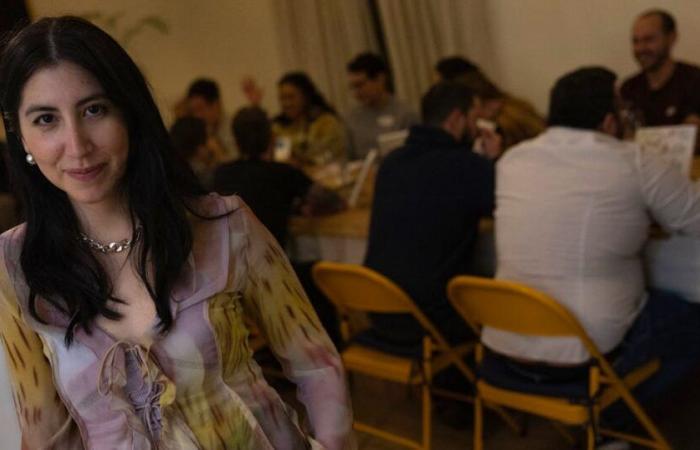(AFP) – One winter evening in Madrid, around a large table, twenty singles discuss, share activities and complicit smiles: tired of failures on dating applications, Eva Sanchez created a “slow dating” club, to break “love pessimism” by reconnecting with reality.
Pierre-Philippe MARCOU / AFP
Barely an hour before, these ten women and ten men aged 25 to 35 were measuring each other with apprehension for their first participation in this “slow dating club”.
A concept which has conquered many large European cities and which Eva Sanchez, 28, wanted to develop in Madrid after an “umpteenth +ghosting+”: a suitor with whom she was chatting online disappeared without any explanation.
“My generation wants a healthy relationship but applications have created pessimism in love, it’s hard to believe it,” this creative director confided to AFP.
Familiar with the codes of marketing, the young woman promotes her “club” by posting posters “No trust in dating apps” on the walls of Madrid, with the name of her Instagram page.
Once a month, the Hispanic-Peruvian organizes an aperitif with a different theme and location, during which participants “don’t feel like they’re on a date”, for around thirty euros.
To break the ice, she organizes games, manual activities, “everything is an excuse to bring out your cutest side”.
– Apps losing speed –
In Madrid, the British Tom Hopcroft has also started organizing events around “dating” through his Instagram page with the provocative name – “Guiri de mierda” (“Shit tourist”).
It targets singles from all over the world who have recently settled in the Spanish capital or Barcelona and is sold out for each session.
Conversely, dating applications are experiencing a certain disenchantment: downloads of Tinder, Bumble, Meetic, Grindr have fallen by almost 20% since 2020, according to data from Sensor Tower, a digital data analysis agency.
The stock market valuation of Match Group (Tinder, Hinge, Meetic), the leader in online dating, has melted, going from 47 billion euros to its highest in 2021, after the peak of the epidemic of Covid-19, to 7.7 billion today.
-“There is a continued slowdown in the use of online applications,” analyzes Seema Shah, manager at Sensor Tower. “Generation Z (born in the late 90s) prefers to meet in person rather than online.”
Faced with the fall in their income, online dating players have been forced to renew themselves by also offering group activities or friendly meetings.
Damián, 33, left behind the dating applications of which he knows “the unsavory underside” after having worked on their algorithms as a computer developer.
“I decided to meet people in real life, by going out and socializing, it’s harder,” admits the Franco-Spaniard, met during an event for singles organized by Eva Sanchez.
– “Disenchantment” –
“We have become so accustomed to the screen that we have lost this attraction for direct interaction with people like our parents did,” confides Isabel, a 28-year-old Chilean lawyer: “When we go out with friends, we almost afraid to approach a table. We are afraid of appearing a little strange or intrusive.
Among the young patients she sees in her Madrid office, psychologist Esther Jiménez notices “disenchantment”.
“They consume dating as entertainment without the intention of truly connecting with the other person, which creates a lot of desperation among young people who would like to find someone. Self-esteem is affected,” notes this couples specialist, also a sexologist.
“We live in a society where we are connected 100% of the time and yet the general feeling of loneliness is very frightening. Ultimately, we are gregarious beings, which is why we seek connections,” she adds.
According to the therapist, “slow dating works because you assume that you will find other people who want the same thing, young people feel safe in these meetings”.
But “the focus should not be so much on the medium as how we use it: are we consuming people or are we seeking connections?”



